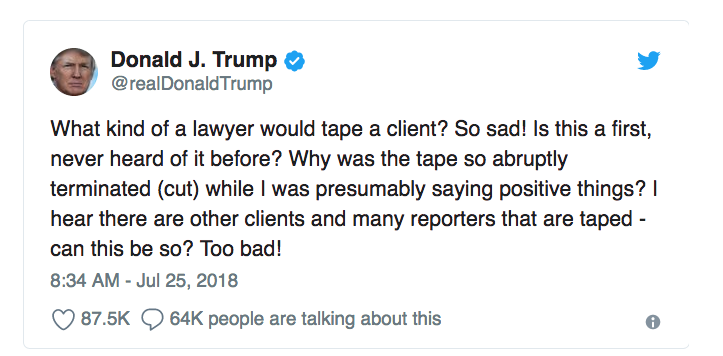
Aardvark salutes the Patriotic Millionaires. Learn what they’re doing. Join them. Become a Friend. Check ‘em out at patrioticmillionaires.org.

Aardvark salutes the Patriotic Millionaires. Learn what they’re doing. Join them. Become a Friend. Check ‘em out at patrioticmillionaires.org.
In my last post I quoted from an article on how the boys and girls over at the American Bankers Association and the United States Chamber of Commerce are beginning to see the wisdom of finding some D politicians to support. In this post, I add some further observations. And, by the way, this morning President Snowflake is twittering all over himself about the trend. Tweet away, asswipe.

My name is not Nostradamus, nor am I normally in the business of counting unhatched chickens. But I can reason, and I can see the straws in the wind.
Big Business does not cotton to divisiveness among its customer base. Nor does Big Business thrive on cultural nostalgia and fear the future. You can still buy vinyl records or rotary phones. Should you require a buggy whip, Amazon will sell it to you. But Big Business does not make its profits supplying the goods and services of the past.
On the contrary, successful businesses are always thinking hard about how to capitalize on the next big trend. Specifically, about how to capitalize on the next big trend before the folks in the next office building figure it out. So that they can gain what the microeconomists call “first mover advantage.” So that they can earn monopoly profits.
It’s the future where the money is made. Nostalgia is for suckers.
What Big Business needs right now is a check on Donald J. Trump. Specifically, they are in urgent need of politicians to check
For years Big Business has been propping up Senator Cornpone, Senator Cornpone has been conning the rubes, and Senator Cornpone has been voting the straight American Bankers Association/U.S. Chamber of Commerce policy agenda. For years, the bogus appeal to nostalgia, radial animus, and general backwardness did not get in the way of the Big Business con. It was a terrific Faustian Bargain while it lasted.
No longer. In his heart, Senator Cornpone may be entirely willing to protect the international trading system, the international security system, and immigration, in exchange for the flow of money from Big Business. But in the present circumstances, Senator Cornpone can no longer do that.
Senator Cornpone is as useless to Big Business as a VHS player or a stack of vinyl records.
And, I am pretty sure, the very Republican brand is quickly becoming a liability to the Big Business.
In the medium or long term, they will probably try founding a “new” political party. Certainly, they will think long and hard about doing so.
In the short run, they need them some Democrats.
So they can make beautiful music together.
‘It’s a significant shift in our thinking’: Business takes fresh look at Democrats:
Business groups, at war with President Donald Trump over trade and immigration, say they’re taking steps to rebuild the political center — including taking fresh looks at moderate Democrats.
The American Bankers Association this month began airing ads in support of candidates for the first time, including Democrats Sen. Jon Tester of Montana and Rep. Lou Correa of California. The International Franchise Association has more than doubled its support to Democrats this cycle, with 27 percent of its donations going to centrists in the party. The U.S. Chamber of Commerce, which leans heavily Republican, endorsed Democratic Rep. Josh Gottheimer of New Jersey over Republican John McCann, who has the support of former Trump aide Sebastian Gorka. …
“Republicans aren’t the only people who have great ideas for business,” International Franchise Association President Robert Cresanti said. “We really need more members of Congress that are in the middle and are willing to listen to both sides.”
“It’s a significant shift in our thinking,” Cresanti said. “Before, it was you’re either with us 100 percent of the time or you’re against us.”
Charles Koch says he’d work with Democrats who share his values
And what, pray tell, my dear Mr. Koch, would the values that you share with the Democratic politicians whom you can buy?
A network of secret-money nonprofit groups has spent millions of dollars attacking swing-seat House Republicans on health care and taxes, quietly becoming one of the biggest players in the 2018 political landscape.
The groups have local members and names like Floridians for a Fair Shake, Michigan Families for Economic Prosperity and North Carolinians for a Fair Economy. But they are all linked to one obscure nonprofit in downtown Washington, D.C.: the Sixteen Thirty Fund, which has funneled millions of dollars to progressive causes in recent years and set up each of the new groups, according to D.C. corporation records.
Added together, the Sixteen Thirty Fund groups have been among the most prolific political advertisers of 2018. They have aired 6,885 broadcast TV ads since Jan. 1, according to Advertising Analytics, a TV tracking firm — more than the U.S. Chamber of Commerce and almost as many as Americans for Prosperity, two of the five biggest nonprofit political advertisers focused on the House and Senate in the first half of this year.
The network, which has spent over $4.6 million on TV alone, has also been one of the top political advertisers in the country on Facebook, according to a POLITICO analysis of data from the social media company’s new political ad archive.
The ads don’t expressly advocate voting against House Republicans, but they do blast incumbents for their votes on Obamacare repeal and the new tax law in more than a dozen congressional districts. The two issues are ones that Democrats want at the forefront of their campaign to take back the House, though keeping the focus on those issues has been difficult amid a maelstrom of other stories involving President Donald Trump, including the ongoing investigation into Russian interference in the 2016 election.
Scott Bland, Liberal secret-money network hammers House GOP

At least when Nixon went to China he didn’t tell the world that all our differences were due to stupid Americans and that Mao Zedong was far more credible than CIA director Richard Helms and the rest of the Deep State goons working in our intelligence and law enforcement agencies. Tricky Dick was a paranoid thug but half the country wasn’t convinced with good reason that he was a helpless agent of a foreign power.

Farm groups go on anti-tariff blitz after Trump offers trade aid
Americans don’t think President Trump has been tough enough on Russia, according to a new NPR/PBS NewsHour/Marist poll conducted after Trump’s summit in Helsinki last week with Russian President Vladimir Putin.
Nearly two-thirds said so, and it wasn’t just Democrats. Almost half of Republicans surveyed (47 percent) also said Trump hasn’t been tough enough on Russia, with just 20 percent saying he has taken about the right approach.
As to whether Trump should view Putin as a friend or foe, Americans are nearly evenly split, with 45 percent saying he should be seen as an enemy and 44 percent saying he is an ally. That might be a surprise to those who grew up in the Cold War era, but partisanship might have something to do with it. Among GOP voters, 58 percent view the Russian leader as an ally. …
But a whopping 72 percent of Americans said they have faith in the CIA’s and FBI’s conclusions about the assessment of the Russian election interference, compared with just 15 percent who believe Putin’s denials. Trump has said Putin strongly denies any involvement. Eighty-six percent of Democrats say they believe the intelligence community over Putin, and 63 percent of GOP voters say the same thing. However, 21 percent of Republicans do say they believe Putin’s dismissals. …
Female voters say they prefer Democrats this fall by a 21-point margin, 54 percent to 33 percent. Republicans win men by 9 points, 48 percent to 39 percent.
Negative opinions of Trump are pronounced among women. Trump’s job approval has remained relatively static — still underwater at 39 percent approval to 51 percent disapproval among all Americans. But there is a staggering 43-point gender gap with 62 percent of women disapproving of Trump’s job and half of men approving of his performance.

**
Aardvark welcomes recent readers from Martinique and from French Guiana. The Aardvarks hope to visit you soon on Martinique. Don’t know when we’ll make it Guiana.
Lots of buzz this week about the Washington Post’s tragicomic report from Luverne, Alabama.
As the Post reports, the folks in Luverne live in a “binary world”: you’re either with them or against them. And Trump has been sent by God to smite those who are against them.
A talking head remarked that, for many, tribalism has triumphed over national interest. In Luverne, tribalism has also triumphed over the Christian religion, which has become a rancid parody of itself.
When I was a wee lad, my parents worshiped at the First Baptist Church. At the age of four, I became a Sunbeam.
And here was the first song they taught me when I was a little Sunbeam:
Jesus loves the little children,
All the children of the world.
Red and yellow, black and white,
They are precious in his sight.
Jesus loves the little children of the world.
I would be willing to bet that there are still little Sunbeams in the First Baptist Church of Luverne. And that they are still learning how Jesus loves all the children of the world.
But tell me, mommy, would that also include the little children being snatched away from their mothers at the border?
Jesus taught in parables, and the most famous parables, the one everyone knows, is the parable of the Good Samaritan. And as little Aardvark learned in the First Baptist Church so many years ago, the whole bloody point of the story was that A SAMARITAN WAS SOMEONE FROM A DESPISED RELIGIOUS/ETHNIC GROUP.
Give me a break.

These folks have turned their religion upside down. As another commentator has pointed out, the cognitive dissonance must be mind-boggling.
What’s the explanation for the craziness down in Luverne? A piece of it is captured by the observation that we are sorting ourselves into two groups: those who have the gumption to leave places like Luverne, and those who don’t.
A friend cites Richard Cohen: “My guess is that it’s a low-boil rage against a vague and threatening liberalism — urbane, educated, affluent, secular, diverse and sexually tolerant. It is, in other words, some of the same sentiment that once fueled European fascism.” The same friend also draws our attention to “the defining characteristics of the Authoritarian Personality sensu Adorno et al.”
Like the man who greeted Justice Frankfurter with great relish, I look to the Modeling Religion Project of the Center for Mind and Culture to explain how little Sunbeams turned into the folks filling the pews in Luverne:
For centuries, scholars and scientists have posed the question: what are the most compelling features of religion? Is it complex theological systems? Rituals that increase social solidarity? Fear of the afterlife or the unknown? In response to these questions academics from philosophers to evolutionary biologists who study religion have developed numerous theories to help explain religious beliefs and behaviors. But how do these approaches relate to one another? How could their relative merits and flaws be tested systematically?
At CMAC, we tackle these questions by turning to an unconventional source: computer modeling and simulation. By building agent-based and system-dynamics models of psychological and social processes, we are creating comparable versions of theories that can be rigorously tested against real-world data and the historical record.
This undertaking requires a wide variety of experts, including scholars of religion from the humanities, cognitive psychologists, and complex system specialists, as well as modelers and programmers. It has unfolded across three organizations (CMAC, the Virginia Modeling and Simulation Center, and the Center for Modeling Social Systems at the University of Agder in Norway), and brought together a large international and interdisciplinary team. Our work modeling religion has enabled our team to clarify and operationalize theories of religion, build realistic and complex AI systems and introduce the power and potential of simulation in the social sciences.
Yes, farther along, through system-dynamics models of psychological and social processes, we’ll understand it, all by and by.



Here’s Spencer’s full statement [explaining how his fears led him to be duped]:
“In 2017 I received countless death threats in connection with my introduction of legislation involving the wearing of masks. The threats escalated to the point that my wife received threatening phone calls concerning her and my children. I was very afraid for my safety and the safety of my entire family.
“Then, on June 14th, a gunman opened fire at members of Congress on a baseball field. I knew people on that field. Now, the fears I already had became more intensified as the reality of my family being targeted by a similar, deranged, would-be assassin became even more possible. I was in such a poor state of mind that my wife and I also undertook marriage counseling with a licensed therapist during this time.
“Sacha Baron Cohen and his associates took advantage of my paralyzing fear that my family would be attacked. In posing as an Israeli Agent, he pretended to offer self-defense exercises. As uncomfortable as I was to participate, I agreed to, understanding that these ‘techniques’ were meant to help me and others fend off what I believed was an inevitable attack.
“My fears were so heightened at that time, I was not thinking clearly nor could I appreciate what I was agreeing to when I participated in his “class”. I was told I would be filmed as a “demonstration video” to teach others the same skills in Israel. Sacha and his crew further lied to me, stating that I would be able to review and have final approval over any footage used.
“I deeply regret the language I used at his request as well as my participation in the “class’ in general. If I had not been so distracted by my fears, I never would have agreed to participate in the first place.
“I apologize to my family, friends, and the people of my district for this ridiculously ugly episode. Finally, there are calls for me to resign. I recently lost my primary election, so I will not eligible to hold office next term. Therefore, I will finish the remaining five months at my post and vacate my seat.”
The answers are, respectively, yes to the first question and no to the second. See Peter Beinart, writing this morning in the Atlantic, The U.S. Needs to Face Up to Its Long History of Election Meddling.
And here are some more questions, asked and answered by Aardvark.
Did Putin violate an existing international norm by covertly interfering in U.S. elections? Apparently not.
Should there be an international norm against covert interference in other countries’ elections—especially where those elections are free and fair, though likely to produce outcomes we don’t like? Yes, I think there should be.
Regardless of the answers to the preceding questions, is it right to label as treasonous an American who aids and abets foreign meddling in U.S. elections?
You betcha.

I attended a Quaker funeral today. This song is for you, Perry. May you rest in peace. And it’s for my great-great-great-great-great-great-great-great-grandmother, who was 16 years old in the year 1658, when she “received ye Truth” and began to walk in the Light.

From Politico yesterday evening:
What does Putin want? What is Trump thinking? Is Trump a Russian asset doing Putin’s bidding? Is Trump just clueless?
The debate goes on. In an earlier post I cited one pundit who argues that Putin has switched and is now trying to help the Democrats win the midterm elections.
As I said, along with everyone else, I don’t know what the hell is going on. But maybe the most parsimonious explanation that best fits most of the relevant facts is that Trump is acting as Putin’s sock puppet in a giant conspiracy to destroy the Republican Party.

We are surprised, stunned, and deeply saddened. A New Talking Point From the Pro-Trump Fringe: A new line of punditry is bubbling up among the president’s followers online: It was a positive thing that the Russians hacked the 2016 election.
Another pundit writes,
Hard-core Trump supporters are beginning to argue that even if Russia did attack the American electoral system, it was actually a good thing because it helped Donald Trump get elected.
That last argument has not yet filtered up to more mainstream Republican figures, but give it some time. When Special Counsel Robert S. Mueller III closes his investigation and presents all his evidence (and more indictments, surely), no one will really be surprised to hear Republican members of Congress and prominent conservative media figures saying that it all worked out for the best because Hillary Clinton isn’t president, and we should just move on. …
We can speculate on exactly why Trump has been so eager to become Putin’s flunky; it’s obviously a complicated story with roots that go back decades. But what about the rest of the GOP? …
It may be because they’ve convinced themselves that no tactic is too repugnant, no alliance is too distasteful, and no moral compromise is too loathsome when you’re serving the lofty goal of keeping Democrats from power. Or it may be that they’re terrified that their rabid base will decide that they are insufficiently devoted to the cult of Trump. Whatever the reasons, they’ve traveled a long way down this road already, and it doesn’t look like they’re turning back.
Well, número uno, gentle people, please bear in mind that empty suited Republican congressmen were not the first folks in human history to think that the ends justify the means.
Número dos, I hope you all detected the irony in the first sentence of this post, wherein, with tongue in cheek, I declared myself shocked and deeply saddened to learn that many in the Republican base would consciously embrace Putin to achieve their social and political ends. It is highly regrettable. But if it is surprising to you in July, 2018, then you have not been paying attention.
Número tres, this thing hasn’t yet fully run its course. A big chunk of the slowly sinking Republican base will indeed embrace Putin openly. Maybe as many as half of them. Maybe as many as two thirds.
But a big minority of the base will not be willing to go there. When that happens, group one is going to try—probably, successfully—to read group two out of the party.
And the Republican Party will just fall apart.
Couldn’t happen to a nicer bunch of guys.
Andrew Sullivan is usually a pleasure to read. Today, he argues, with customary eloquence, that Trump and Putin have thought alike for decades, and that hence there is no need to postulate a conspiracy to collude. Trump is just doing what comes naturally.
Blake Hounshell, writing in Politico, begs to differ. He begins with a small witticism:
From there things get seriouser and seriouser.
With every other world leader, the physically imposing Trump attempts to dominate—witness his alpha-male handshakes with French President Emanuel Macron or his flamboyant man-spreading next to German Chancellor Angela Merkel. Yet with the diminutive Putin—who is maybe 5 feet, 6 inches tall—he’s oddly submissive. During the public portion of their encounter, Trump was slumping in his chair, as if defeated. Why? Why did he insist on a one-on-one meeting with Putin in the first place?
And why does Trump inevitably return to questioning the irrefutable evidence that Russia meddled in the 2016 election? We can dispense with the explanation, conveyed anonymously by senior administration officials, that “his brain can’t process that collusion and cyberattacks are two different things.” We can also forget about the widely held theory that he views the various Russia investigations as a threat to the legitimacy of his election, and therefore a devastating blow to his sense of self-worth.
Or, at least, neither offers a sufficient explanation for why Trump consistently parrots Russian talking points on NATO, the American media, U.S. troop deployments, Ukraine and the legitimacy of the postwar liberal order. What does any of that have to do with his tender ego? Do we really think Trump has an informed position on, say, Montenegro’s history of aggression? Could Trump find Montenegro on a map?
The proof of the pudding, Hounshell cogently argues, will come when Putin tries to grab another country or two. (I assume that’s what they were talking about in their little tête-à-tête in Helsinki.) Hounshell writes,
If Trump is indeed a tool of Putin, what might we expect him to do next? Well, I wouldn’t be sleeping too soundly in Kiev, Podgorica or Riga right now. If the Kremlin tests America’s wobbling commitment to NATO, watch how Trump responds.
**
Aardvark sends greetings to today’s readers in Belgium, Germany, the United States, Austria, France, and Portugal.
If no one in Latvia, Lithuania, Estonia, or Ukraine cares to tune in, I entirely understand. I’d be busy hiding the siliver in the back yard, too.

In a secretly recorded June 2016 conversation about Ukraine, obtained by The Washington Post, the House majority leader, Kevin McCarthy, said, “There’s two people I think Putin pays: Rohrabacher and Trump.” Far from disagreeing, Ryan said, “What’s said in the family stays in the family.”
Michelle Goldberg, New York Times, July 20

Someone named Garrett M. Graff has written an article titled Why Russia Will Help the Democrats Next. At first, I did not think it was very persuasive. It seemed to have that quality of strained originality that Samuel Johnson detected in some of the manuscripts he reviewed.
Then we learned that Putin will be in Washington just before the election this year, so that Trump can lick his boots in public. Thoroughly. For a long time. After which Trump will extol the taste of the fine Corinthian leather.
That should pretty much put the progressives over the top in November.
For one fleeting moment, Aardvark was tempted to say, “Thank you, Vladimir, for all the love you are showing to Democrats.”
But on sober second thought, Vlad,

Notice how, in the clip, Sarah Huckabee Sanders keeps offering helpful translations of what the Great Dictator is saying.
It seems as if, in the end, it won’t be the treason that brings Trump down. It will be the buffoonery.
Trump’s Russia spin falls flat with GOP:
Trump’s half-hearted statement on Tuesday walking back remarks undermining the findings of the U.S. intelligence community was crafted by adviser Stephen Miller, according to a Republican close to the White House. As Marine One touched down at Andrews Air Force Base on Monday evening, the backlash from pro-Trump lawmakers and activists was sufficient that the president as well as his senior advisers, including Secretary of State Mike Pompeo, press secretary Sarah Huckabee Sanders, Kelly and Miller himself acknowledged the need to do an about-face.
Miller took the lead, and Trump put the finishing touches on the statement — which, according to the Republican close to the White House, “didn’t pass the laugh test.” Sen. Bob Corker (R-Tenn.) acknowledged the statement was significant given Trump’s propensity to dig in: “You could see it was very painful.”
But it wasn’t long before the president backslid again. In the latest twist, Trump seemed to suggest Wednesday he doesn’t think Russia is interfering in the midterms, after bragging about how “tough” he is on Russia.


Eighty-nine percent of Germans can’t be wrong: we are unreliable.
Jonathan Chait, whose middle name is not Pollyanna, writes, Trump Is Fighting the Entire Republican Party to Defend Putin.
Or, then again, maybe not.
The Donald’s walkback has not been met with universal approbation:
The President’s attempt to reverse the damage—clearly the result of a panicked White House staff—only worsened the matter. Speaking from the White House Cabinet Room on Tuesday, Trump tried to take his listeners for fools as he explained that he had merely been misunderstood by the press. This was one of the most shameless walk-back attempts in the history of the American Presidency. Reading from prepared notes, which always lends to his delivery a hostage-like cadence, Trump tried to half-apologize to the American intelligence community for equating its analysis with that of Putin and the F.S.B. And, with that, the lights suddenly went out. The President sat in darkness. Even before the worldwide commentariat had a chance to voice its incredulity, the White House electrical system had called bullshit on Trump. Or was it a higher power?
Afterward, “some Republicans close to Trump”—that would of course be The Donald His Very Self—weighed in:
Some Republicans close to Trump and the White House said staffers should have backed him up more forcefully in the hours after the Putin summit, arguing that the prepared statement amounted to a public cave-in.
“Whoever in the White House advised him to make that statement today should not only be forcibly ejected, but be banned from politics for eternity,” said one of these Republicans, calling Trump’s prepared remarks “ridiculous.”
By contrast, David Frum keeps his focus on the big picture:
The reasons for Trump’s striking behavior—whether he was bribed or blackmailed or something else—remain to be ascertained. That he has publicly refused to defend his country’s independent electoral process—and did so jointly with the foreign dictator who perverted that process—is video-recorded fact.
And it’s a fact that has to be seen in the larger context of his actions in office: denouncing the European Union as a “foe,” threatening to break up NATO, wrecking the U.S.-led world trading system, intervening in both U.K. and German politics in support of extremist and pro-Russian forces, and continually refusing to act to protect the integrity of U.S. voting systems—it all adds up to a political indictment, whether or not it quite qualifies as a criminal one.
America is a very legalistic society, in which public discussion often deteriorates into lawyers arguing about whether any statutes have been violated. But confronting the country in the wake of Helsinki is this question: Can it afford to wait to ascertain why Trump has subordinated himself to Putin after the president has so abjectly demonstrated that he has subordinated himself? Robert Mueller is leading a legal process. The United States faces a national-security emergency.

Standing side-by-side with Putin, who U.S. intelligence agencies have said ordered the campaign of cyberattacks against U.S. political targets, Trump told reporters that Putin had forcefully denied that Russia was to blame for the election-meddling efforts and that “I don’t see any reason why it would be.”
The backlash against the president’s remark prompted Trump to take the rare step Tuesday of admitting a mistake, telling reporters that when he said he didn’t see any reason why Russia would have sought to interfere in the 2016 presidential election, he had in fact meant the exact opposite.
“I actually went out and reviewed a clip of an answer that I gave and I realize that there is need for some clarification. It should have been obvious, I thought it would be obvious, but I would like to clarify just in case it wasn’t,” Trump said. “In a key sentence in my remarks I said the word would instead of wouldn’t. The sentence should have been, ‘I don’t see any reason why I wouldn’t’ or ‘why it wouldn’t be Russia.’”
“So just to repeat it, I said the word would instead of wouldn’t and the sentence should have been — and I thought I would be maybe a little bit unclear on the transcript or unclear on the actual video,” he continued. “The sentence should have been, ‘I don’t see any reason why it wouldn’t be Russia.’ Sort of a double negative. So you can put that in, and I think that probably clarifies things pretty good by itself.”
Like the time she said, “Take your dirty hands off me, you slimeball!” when she clearly meant to say, “DON’T take your dirty hands off me, you loveable slimeball! In fact, why don’t we get drunk and screw?”